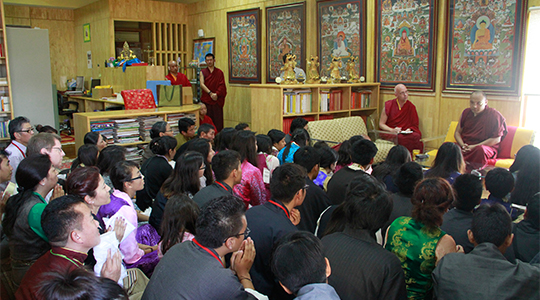August 3rd 2013 – Gyuto Monastery, Dharamsala
Meeting today in Dharamsala, India, with a large group of foreign-born Tibetan children who are currently on a Summer Camp Program, the Gyalwang Karmapa urged them to remember the difficulties faced by Tibetans living in Tibet.
The group of about 60 students included young Tibetans born in Switzerland, Canada, the United States, Ireland and France, who had travelled to India in order to learn about and experience more of their Tibetan cultural roots.
“There are a lot of difficulties that the Tibetans who live in Tibet face, and the responsibility to remove or eliminate those difficulties falls upon all of us who live in foreign countries,” the Gyalwang Karmapa told the young students. “It’s a great responsibility that we have.”
“For all of the Tibetans who live in free countries, who are scattered all over the world, for all of you it is your own individual responsibility. And this is something that you all have to know and understand for yourselves, before anyone else really tells you.”
The Gyalwang Karmapa particularly encouraged the young students to learn the Tibetan language and to learn about Tibetan culture and traditions, advising them that this would be very beneficial.
“Actually you are all from a very different environment, a very different place, living in the midst of other cultures, so to be able to learn Tibetan, to speak Tibetan, and to learn about Tibetan culture and traditions is from one way of looking a very difficult thing to do. It can put a lot of pressure on you. But I hope that all of you can take this pressure and transform it into courage.”
Finally the Gyalwang Karmapa thanked the parents of the students who had sent their foreign-born Tibetan children to India in order to deepen their cultural roots.
“For all of you parents who have taken the interest in Tibetan culture, and who have decided to send your children who are Tibetans to India in order to learn a little bit more about the situation and the culture in Tibet, and to learn the Tibetan language and also about Tibetan culture and traditions – it is very good. It’s something that creates a strong impression and so this is a wonderful thing to do. I’d like to thank you all very much for it.”



